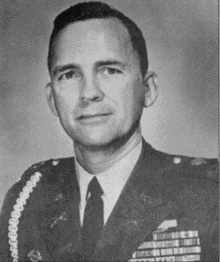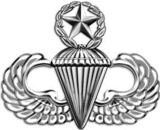Ralph Puckett
| Ralph Puckett, Jr. | |
|---|---|
 COL Ralph Puckett | |
| Born |
December 8, 1926 Tifton, Georgia |
| Allegiance |
|
| Service/branch |
|
| Years of service | 1949-1971 |
| Rank |
|
| Commands held |
Eighth Army Ranger Company Mountain Ranger Division of the Ranger Department 10th Special Forces Group 2d Battalion 502d Infantry (Airborne) |
| Battles/wars |
Korean War Vietnam War |
| Awards |
Distinguished Service Cross Silver Star Legion of Merit Bronze Star Purple Heart Air Medal Army Commendation Medal |
| Other work | Outward Bound, Inc. |
Ralph Puckett Jr. (born 8 December 1926 in Tifton, Georgia) led the Eighth Army Ranger Company during the Korean War. He was awarded the Distinguished Service Cross for his actions on November 25, 1950, when his company of 51 Rangers was attacked by several hundred Chinese forces at the battle for Hill 205.[1][2] He retired from the United States Army in 1971 as a Colonel. After being appointed on 19 July 1996, he has served as the Honorary Colonel of the 75th Ranger Regiment[3] and is frequently in demand as a public speaker for military ceremonies.
Military career
In 1949, Puckett graduated from the United States Military Academy (where he captained the Army Boxing Team), was commissioned as an Infantry Second Lieutenant, deployed to Japan, and immediately volunteered to be assigned with the Rangers. When he was informed that there were no more lieutenant positions in the 8th Army Ranger Company, he said that he would "take a squad leader's or rifleman's job"; positions several grades lower than a lieutenant's. Colonel McGee, who was in charge of forming the company, was so impressed by Puckett's attitude that he gave him the company commander's position; a position normally reserved for Captains. On 11 October 1950, the Eighth Army Ranger Company entered the Korean War, conducting raids during both daylight and night time conditions.[4]
Hill 205
On 25 November 1950, Puckett and his company became famous when they captured and held Hill 205, a strategic point overlooking the Chongchon River. Initially, they had to brace for attack from all sides, as the company of only 51 strong was over a mile from the nearest friendly unit and vulnerable to being completely surrounded. Fortunately for the Rangers, they had artillery support for parts of the night. Earlier in the evening Puckett had coordinated a series of increasingly more dangerous fire missions with the artillery, in order allow the Rangers artillery support to rapidly adjust to new attacks.
At 10pm, the Chinese began their attack by firing a mortar salvo against Puckett and his Rangers. Six waves of Chinese forces assaulted the hill for the next four and a half hours. Several times, Puckett was forced to call in artillery fire "danger close", placing the Rangers within the danger radius of the friendly artillery. During the course of the battle, he was wounded several times, once by grenade fragments and then twice more when a two mortars landed in his fox hole. After his wounds rendered him barely conscious, two of Puckett's Rangers, PFCs David L. Pollack and Billy G. Walls, dragged him down the hill as they received some small arms fire. Ralph Puckett was medically evacuated from the hill and would be hospitalized for a year for his wounds suffered that night.
After Korea
Following the Korean War, Puckett served over two years in the U.S. Army Infantry School Ranger Department as commander of the Mountain Ranger Division. As the first Ranger Advisor in the U.S. Army Mission to Colombia, he planned and established the Colombian Army Escuela de Lanceros (Ranger School). Later, he commanded “B” and “C” teams in the 10th Special Forces Group in Germany. In 1967, then-Lieutenant Colonel Puckett commanded the 2d Battalion, 502d Infantry (Airborne) of the 101st Airborne Division in Vietnam. He was awarded a second Distinguished Service Cross for heroic leadership in August 1967. During a dire, night-long defense near Chu Lai, he inspired his Soldiers, who rallied to repel the attacking North Vietnamese. A rifle platoon leader preparing for a "last stand" recalled Colonel Puckett's effect on the nearly exhausted soldiers: "... word of Colonel Puckett's arrival spread like wildfire. We all stiffened up and felt that nothing bad could happen now because the Ranger was with us."
Retirement
Colonel Puckett retired in 1971 after 22 years of active duty to become the National Programs Coordinator of Outward Bound, Inc. He subsequently established Discovery, Inc. After several years of successful leadership at Discovery, Inc. in Herndon, Virginia, Puckett moved to Atlanta and began the Discovery Program at The Westminster Schools, which became known nationally in the adventure education community. In 1984, he became the Executive Vice President of MicroBilt, Inc., a soft- and hardware computer company. Puckett finally retired to Columbus, GA where he has remained actively involved with the Ranger School at Fort Benning.
Civilian life

He has continued to be very active in military affairs. Puckett was an inaugural inductee into the U.S. Army Ranger Hall of Fame in 1992. He served as the Honorary Colonel for the 75th Ranger Regiment from 1996 to 2006 for which he was awarded the Distinguished Civilian Service Award. He speaks often at graduations and other functions at Ft. Benning and is an Honorary Instructor at The Infantry School. He was inducted into the Order of St. Maurice in 1998, and was the 1998 Ranger of the Year for the Ranger Infantry Companies of the Korean War. He was inducted into the USAF Gathering of Eagles in 1999. He was added to the Tifton, Georgia, Wall of Fame in 2004. Other honors include appointment as an Ambassador of Goodwill by the Western Hemisphere Institute for Security Cooperation, selection as a Distinguished Graduate of the United States Military Academy in 2004, and selection as the Infantry's Doughboy Award recipient in 2007. He is the author of Words for Warriors: A Professional Soldier's Notebook and numerous media articles.
He lives in Columbus, Georgia, with his wife, the former Jean Martin. They have two daughters (Jean & Martha), one son (Thomas), and six grandchildren (Lauren, Dixon, Martha Lane, Jean, Sarah, and Jack).
Awards and decorations
| Combat Infantryman Badge (2nd award) | |
 |
Master Parachutist Badge |
| Glider Badge | |
| Ranger Tab | |
 |
Columbian Lancero Badge |
| German Parachutist Badge | |
 |
Greek Parachutist Badge |
| Vietnam Parachutist Badge |
| Distinguished Service Cross (with oak leaf cluster) | |
| Silver Star (with oak leaf cluster) | |
| Legion of Merit (with 2 oak leaf clusters) | |
| Bronze Star (with oak leaf cluster) | |
| Purple Heart (with 4 oak leaf clusters) | |
| Air Medal (with award numeral "9") | |
| Army Commendation Medal | |
| Vietnam Cross of Gallantry (with Palm) | |
| Decoration for Distinguished Civilian Service | |
| United States Special Operations Command Medal | |
| Order of Saint Maurice (Primicerius) |
Legacy
- Colonel Ralph Puckett Parkway, a stretch of First Division and Dixie roads running from the end of I-185 to Sightseeing Road on Fort Benning, was dedicated on 8 June 2012.[9][10]
- Colonel Puckett is the namesake of the Colonel Ralph Puckett Leadership Award series.
- The first award is a competition to identify a junior officer in the Ranger Regiment that sticks out amongst his peers for his take charge attitude. The contest extends over three days and nights and consists of several different physical fitness tests, weapons firing, military skills, essay preparation, and appearance before a board of officers and senior noncommissioned officers. The winner of the award is considered by the Regiment as the entry in the Army-wide MacArthur Award competition.
- The second award is presented to the Officer Honor Graduate at the U.S. Army Ranger Course. Recipient of this award performs successfully in each leadership position, completed the demanding Ranger Course without repeating any phase, and was acclaimed by his peers.
- The third award is presented to an officer in the Maneuver Captains Career Course who displayed exceptional leadership and exhibits exemplary physical condition, consistent high academic standing and served in a leadership position.[11]
References
- ↑ Ralph Puckett, WD AGO FORM 639 dated 11 Jan 1951
- ↑ Lock, John D.; Moore, Harold G. (2001). To Fight With Intrepidity: The Complete History of the U.S. Army Rangers 1622 to Present. Fenestra Books. ISBN 1-58736-064-0.
- ↑ USMA class of 1982 recommendation for COL Puckett for the Distinguished Graduate Award
- ↑ 1949 USMA graduate Puckett
- ↑ Ralph Puckett Hall of Valor awards
- ↑ COL Ralph Puckett biography
- ↑ bio - Fort Benning MWR
- ↑ Puckett bio picture
- ↑ Fort Benning road renamed for retired Army Col. Ralph Puckett
- ↑ Colonel Ralph Puckett Parkway
- ↑ Colonel Puckett Leadership awards